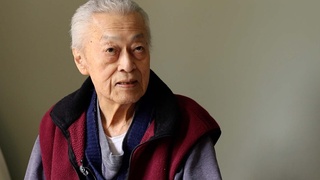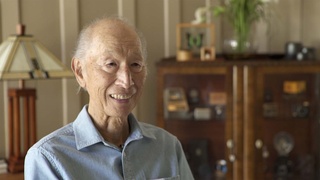Interviews
Mother was ordered to speak English during FBI house search
The third agent went through the house, and took down – he went through the kitchen, and I heard all this rattling. He took down all the dishes, apparently, and was looking through the cupboards in the kitchen, and they took down framed pictures off the wall, and tore open the backs of the frame, you know, like – and they rolled up the rug on the...on the floor. Very thorough, you know, examination of the house – searching the house for whatever. We were puzzled, I think. We were sitting there, you know, just completely dumbfounded, I think, that this was going...“What is it that they want from us?”
And after several hours, they left. And in the meantime, my mother came home from church. And she came in the front door - and she had forgotten her keys, so she rang the doorbell, and she came in and said, “Well what’s going on?” you know, in Japanese. And so the guy said, “Don’t talk in Japanese! Talk in English.” And so...and so she was – of course my mother was monolingual at that point, and so she – then she was ordered to sit down with us, and she did. And we couldn’t – she kept on saying, “What – who are these people?” you know, and “What do they want?” and so forth, and she was talking in Japanese, and it was – she was told to shut up. And, you know, “Don’t talk in Japanese. Talk in English,” and so we didn’t – we sat there very quietly for a long, long time.
Date: August 7, 2018
Location: California, US
Interviewer: Sharon Yamato
Contributed by: Watase Media Arts Center, Japanese American National Museum
Explore More Videos

Sister’s Trauma from being Incarcerated during World War II
(b. 1932) Nisei American stage, film, and TV actress

School held emergency drills at the start of World War II
(1934–2018) Japanese American designer, educator, and pioneer of media technologies

Father lost everything during World War II
(1934–2018) Japanese American designer, educator, and pioneer of media technologies

His family Traveled to Japan in 1940
(b. 1938) Japanese American. Hiroshima atomic bomb survivor

His Memory of August 6, 1945
(b. 1938) Japanese American. Hiroshima atomic bomb survivor

Escape from Hiroshima
(b. 1938) Japanese American. Hiroshima atomic bomb survivor

Returning to Hiroshima in ruins
(b. 1938) Japanese American. Hiroshima atomic bomb survivor

Overcoming trauma and speaking about his A-Bomb experience
(b. 1938) Japanese American. Hiroshima atomic bomb survivor

Family having to hide guns during World War II in Colombia
(b.1974) Japanese Colombian who currently resides in the United States

Japanese were treated with dignity during WWII (Spanish)
(b.1974) Japanese Colombian who currently resides in the United States

Enjoying undokai and sports in Crystal City
(b. 1936) Japanese Peruvian incarcerated in Crystal City

Kids activities in Crystal City
(b. 1938) Japanese Peruvian incarcerated in Crystal City

Having nowhere to go postwar
(b. 1938) Japanese Peruvian incarcerated in Crystal City

Finding family’s barrack on map of Crystal City
(b. 1942) Japanese Peruvian incarcerated in Crystal City

Help received in fighting deportation
(b. 1942) Japanese Peruvian incarcerated in Crystal City
